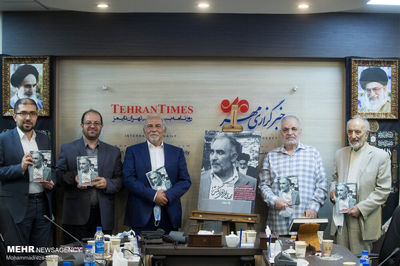Writers Seyyed Mostafa Hosseini and Abdorreza Nematollahi and a number of Araqi’s comrades, including Mohsen Rafiqdoost and Ezzatollah Shahi, attended the meeting organized at the Mehr News Agency.
Nematollahi has previously directed the documentary films “A Lone Knight” and “Kill Mehdi Araqi” about the political dissident.
Sorush is the publisher of the book that carries interviews conducted with 30 political figures from his family and friends. Ali-Akbar Nateq Nuri, Seyyed Mahmud Doai, Farrokh Negahdar, Behzad Nabavi, Rafiqdoost and Shahi are among the figures.
Speaking at the meeting, Rafiqdoost recounted part of his memory from Araqi’s meeting with Imam Khomeini, the founder of the Islamic Republic, after the victory of the Islamic Revolution.
“He looked at Hajji Mehi with great affection,” said Rafiqdoost and added, “Among the revolutionary clerics, I know that Imam highly liked Mr. Hashemi Rafsanjani, but among the ordinary revolutionary personalities, Hajji Mehdi was Imam’s favorite.”
Araqi joined Fadaian-e Islam, an Islamic group with a strong activist political orientation, from his youth. He was imprisoned for six months for his protest against the detention for Seyyed Mojtaba Navvab Safavi, the founder of the group.
After his release from prison, he split from Fadaian-e Islam, joining Imam Khomeini in his struggles against the Shah.
At the same time, he joined the Islamic Coalition Party, a conservative political party, which was under Imam Khomeini’s spiritual leadership.
Araqi was detained along with a number of the members following the assassination of Hassan-Ali Mansur, the prime minister of the Shah.
He received a life sentence in 1965, however, he obtained an early release from prison after 13 years.
He made great efforts to revive the Islamic Coalition Party and joined Imam Khomeini living in exile in Neauphle-le-Chateau in France.
Imam Khomeini sent him to Tehran with a mission to organize marches against the Shah during Tasua and Ashura on December 10 and 11, 1978.
The marches were successfully organized and Araqi returned to France afterward. Araqi was one of those people who accompanied Imam Khomeini on his return to Iran on February 1, 1979.
After the victory of the Islamic Revolution, he served as the warden of Tehran Qasr Prison, wherein he was held for years.
He also collaborated with Mostazafan Foundation and the Persian daily Kayhan, and finally, was assassinated by the terrorist group Forqan on August 26, 1979.
Source:Tehran Times

